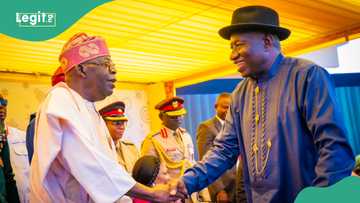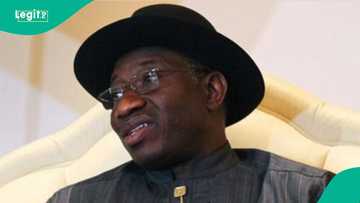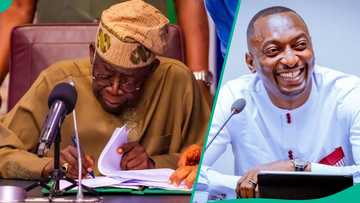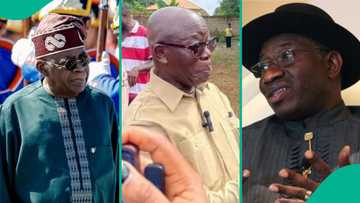Real Reason Tinubu Sacked Popular Presidential Aide Finally Emerges
- President Bola Tinubu's sacking of Fagbo Umunubo as the special assistant to the president on digital and creative economy has taken a new twist
- Presidential sources have disclosed that the former presidential aide was sacked over allegations of fraud with several film-makers
- On Monday, September 8, when Umunubo was sacked, the presidency warned the public against relating to him as a presidential aide
The actual reason President Bola Tinubu sacked the former special assistant on digital and creative economy, Fagbo Umunubo, who worked at the office of Vice President Kashim Shettima.
It was learnt that the former presidential aide was sacked because he was linked to several scams in the creative industry. It was learnt that Umunubo allegedly executed many of the scams under the cover of his presidential office.
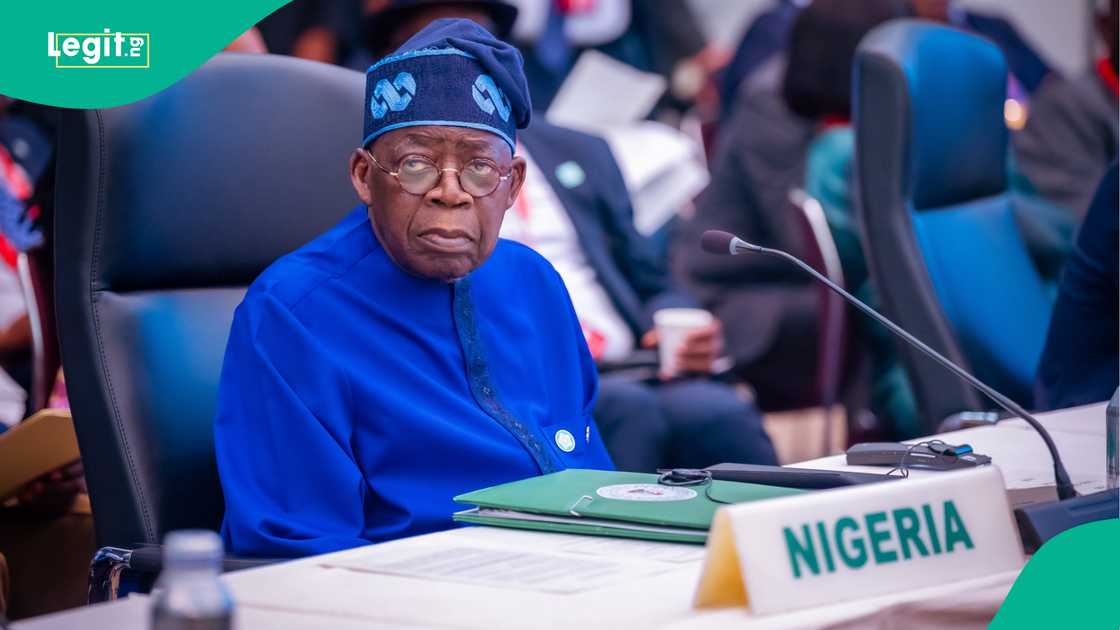
Source: Twitter
Sacked presidential aide strikes dirty deals
According to Premium Times, Several sources within the presidency disclosed that Umunubo struck several dubious sponsorship deals with some filmmakers and creatives. He promised them government support funding and visibility that never came to fruition.
Some of the most prominent cases included a sponsorship deal he made with the filmmaker and author, Arese Ugwu, the man who created the “The Smart Money Woman” series.
The medium cited a document that showed Umunubi, using his position as the special assistant to the president on digital and creative economy, to make deals. He had promised a sponsorship worth N10 million for the marketing and premiere of Lara Unlimited, a spin-off of Ms Ugwu’s work.
It was reported that part of the agreement included promotional rights for the digital economy office in the presidency, which the movie posters and backdrops would have its brand. Before the screening, a 30-45 second advert will come before, it will also be featured in podcast episodes and Ms Ugwu and other influencers' shoutouts.
When did Tinubu sack Umunubo?
The sacking of Umunubo was disclosed in a statement from the office of the presidency, warning the public to desist from addressing him as a member of his administration. The president warned that any member of the public who addressed Umunubo as a member of his government "does so at his or her own risk".
In the statement, which was signed by Abiodun Oladunjoye, the director of information and public relations at the state house, the presidency explained that Umunubo no longer represents the Tinubu administration "in any capacity.
The government then warned the public against relating to Umunubo as a member of the Tinubu government, adding that any Nigerian doing that "does so at his or her own risk." He added that the warning was to guide the public about the former presidential aide.
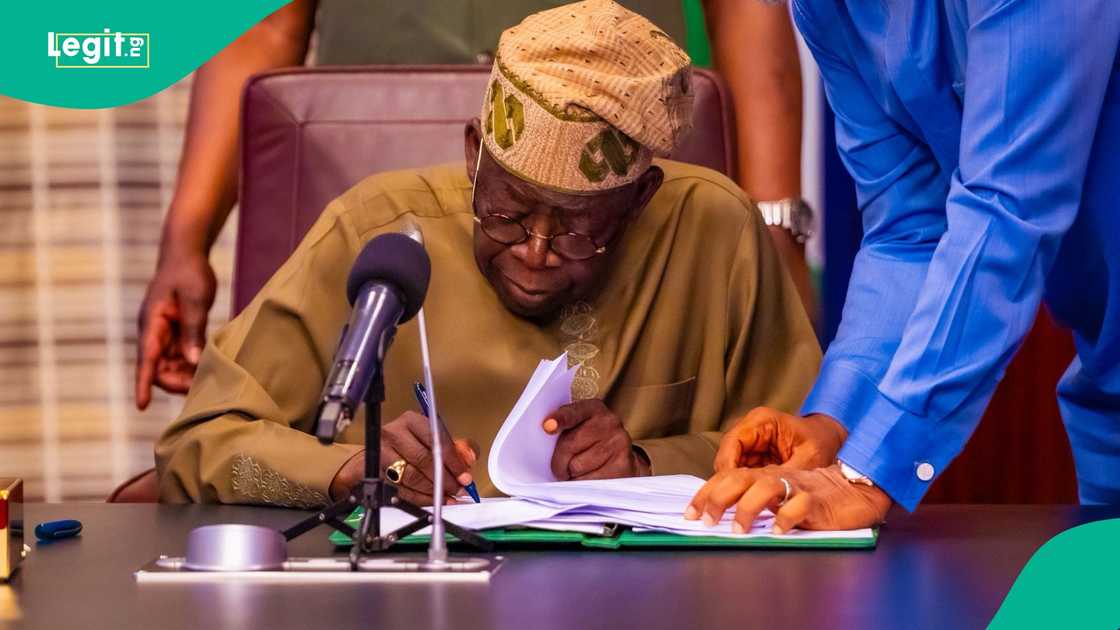
Source: Twitter
Why Aide`s dismissal may not be enough - Analyst
The dismissal of the presidential aide on Digital and Creative Economy has opened up fresh debate on governance and accountability in Nigeria.
Lekan Olayiwola, a public-facing policy analyst who spoke with Legit.ng described the incident as a moment that “opens a window into the fragility of Nigeria’s accountability architecture.”
Commending the dismissal, he noted that “the president’s swift action was decisive and reassuring. Yet beneath that immediacy lies a set of deeper, structural vulnerabilities that continue to undermine governance in the country.”
The peace and conflict researcher observed that, “when state officials allegedly leverage their proximity to power for private gain, they reflect a broader culture in which state authority is treated as personal capital rather than civic trust. In such a system, access often substitutes for accountability, and informal influence becomes a currency that distorts public service.”
According to him, the incident shows the “weakness of institutional oversight” and the extent to which Nigeria “still relies on executive discretion rather than embedded, independent checks and balances.”
While acknowledging the dismissal as a signal of commitment to ethical leadership, he said,
“Governance risk management must be preventive, not reactive. The dismissal followed public exposure and reputational risk, reinforcing a pattern of crisis management rather than a culture of anticipatory, ethical governance.”
Public office needs clear ethical boundaries – Olayiwola
He, however, called for reforms that would shift attention from punishing individuals after misconduct to embedding ethical deterrence in institutions:
“Appointees need clearly codified ethical boundaries, especially in sensitive sectors like entertainment and digital media, where informal influence is pervasive and the lines between public support and private gain are easily crossed.”
The analyst further proposed a public ethical code, independent oversight mechanisms, and mandatory disclosure of sponsorships to restore trust:
“Independent oversight mechanisms, free from executive interference, are essential for monitoring presidential aides and ensuring real accountability.”
Olayiwola also stressed the importance of civic education for public officers, adding that “public office is a form of stewardship, not a shortcut to influence. Officials must be equipped not only with policy tools but with a moral compass that guides their conduct in complex and often ambiguous situations.”
The expert warned that the challenge goes beyond one aide’s removal:
“It is about institutionalising a culture of accountability, the lack of which poses reputational risk, erosion of public confidence, and political legitimacy, even to well-meaning administrations.”
He concluded with a call for systemic reform:
“Nigeria’s political system must evolve beyond personalised authority and embrace a model of stewardship where public office is held with humility, exercised with transparency, and guided by a commitment to the common good.”
Former Buhari's minister denies dumping Tinubu
Legit.ng earlier reported that former President Muhammadu Buhari's ex-Minister of Aviation, Hadi Sirika, has said he was not part of the coalition movement.
Recall that former Vice President Atiku Abubakar started the coalition movement, which was plotting to sack President Tinubu in the 2027 election.
This would be the second term he former minister would be denying his alliance with the coalition movement and upholding Buhari's values.
Editorial assistant Ololade Olatimehin provided exclusive commentary from a public-facing policy analyst for this report.
Source: Legit.ng

